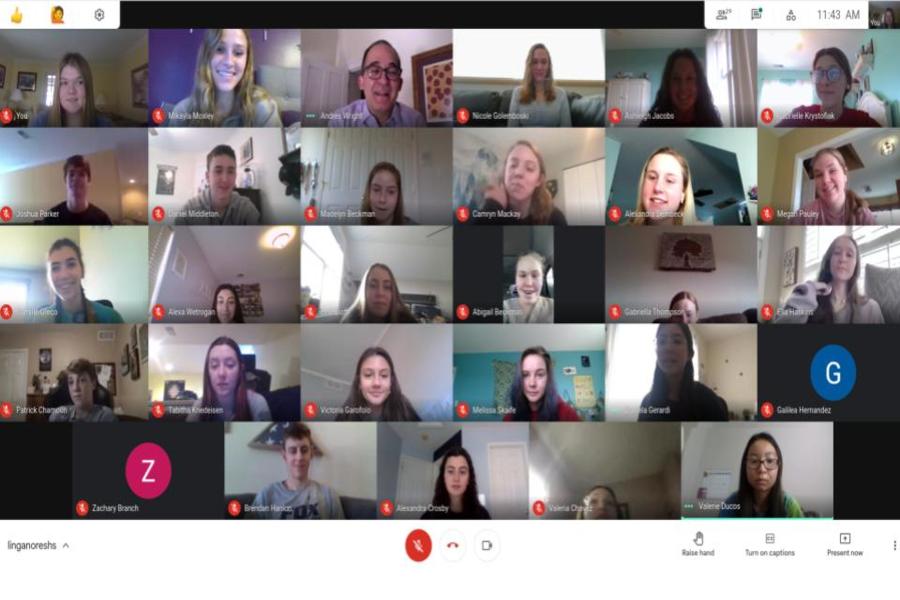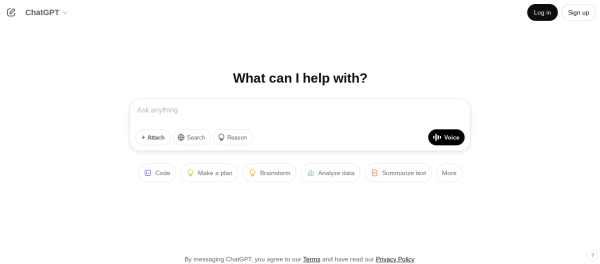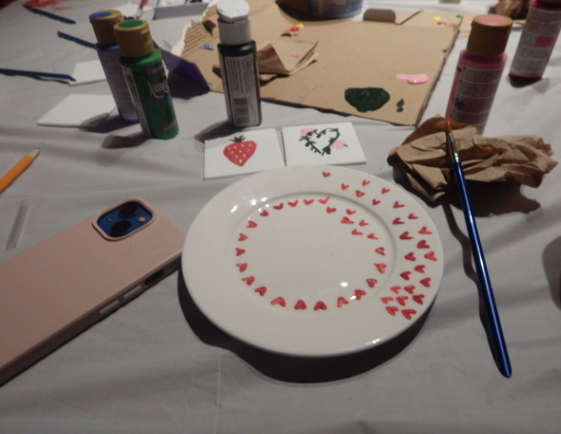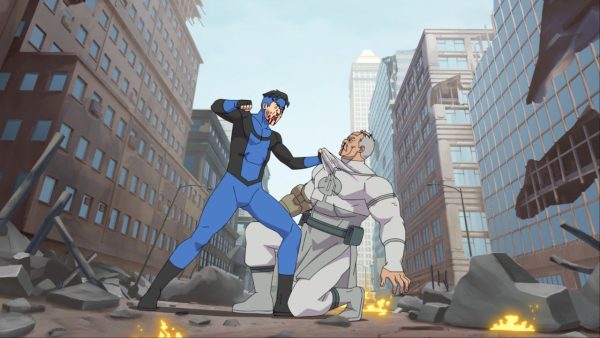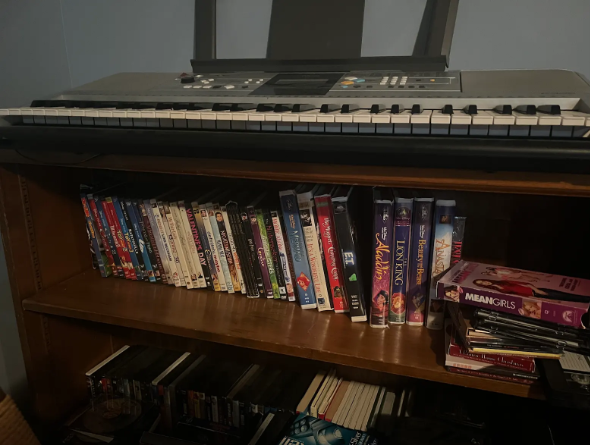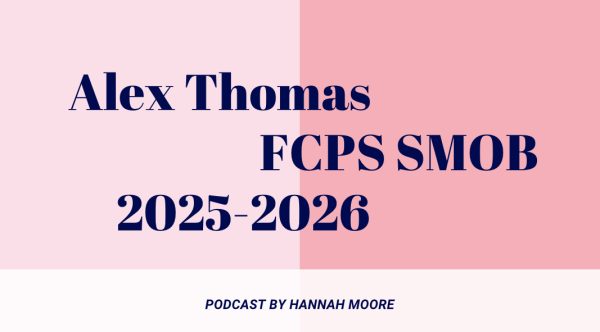Reaching for the (virtual) stars: Linganore honor societies continue to thrive in pandemic
Student members of Linganore’s Spanish Honor Society enjoy each other’s company as they engage in discussion during one of their monthly virtual meetings.
How do you keep honor societies active in a virtual world? Hybrid = everything is harder. Advisors and officers were puzzled over this in the National English Honor Society, Spanish Honor Society, Rho Kappa, Mu Alpha Theta, and many other honor societies.
The leadership have worked tirelessly to continue providing quality activities and opportunities for their members.
Additional Officer Responsibility
Virtual meetings and events have more to consider. With the addition of these responsibilities comes the reminder that officers are all students with demanding schedules and chapter advisors are unpaid volunteers who add this activity to their teaching duties.
Mu Alpha Theta president Renata Farrell said, “Being in the online environment, I cannot walk down the hall to ask an advisor a question. This means that planning meetings and helping plan events takes a lot longer. This makes me realize how hard our teachers are working during this time, and I have a new appreciation for how much extra work the online environment creates.”
Advisors to both adopt and delegate to the student officers in order to ensure that the few shortened meetings the society are able to hold run smoothly and efficiently.
Spanish Honor Society President Val Ducos said, “There has to be more involvement and dedication to get everything done virtually. This includes sending updates and reminders, working with students’ schedules, and communicating with everyone consistently through Schoology. Monthly PREP meetings ensure everyone is informed of current and upcoming events.”
The increased efforts do not stop at thoughtfully planning and actively notifying members,as officers of other honor societies have also had to navigate handling attendance and recording participation during their virtual group meetings.
National English Honor Society president Maya Apau said, “Due to us being virtual, we’ve had a lot of incidents with students and their hours and requirements. If we were in person, we would have a recorded list of who was where, simple and easy. But during virtual events, students can just share reflections of events and we might even miscalculate who was or wasn’t on a Google Meet. I think that this year I had to be strict when it comes to hours: what to accept and what to rule out.”
Regardless of technical difficulties, Google Meet remains the tool that is allowing members to at least stay in contact with each other.
“Still having honor society activities has helped fill in the social gap caused by virtual school. It has been nice talking to people again. You’re surrounded by those with similar interests and it is a great way to meet and talk to people. NEHS has connected Linganore students to those at Frederick and Brunswick, which has also been fun!” said NEHS member Erin Patterson.
Member Engagement
Keeping members engaged in the activities of a virtual honor society can be challenging.
“It was easier to set activities up and communicate with officers, advisors and even members in school. You could just find them in the hallway or pop into a classroom. Now there has to be more involvement and dedication to get everything done and still create enough opportunities for the members to participate. Especially with everyone’s different schedules,” said Ducos.
According to Natalie Rebetsky, advisor for the National English Honor Society, NEHS has actually experienced more engagement in their virtual activities than they would in a traditional year.
“I’d say that our turnout at events this year has been much higher than in the past. We have done events with Rho Kappa, Mu Alpha Theta, the AACC and the Book Club. Combining with other groups has also been a strength,” said Rebetsky.
Many members agree. Spanish Honor Society member Tabitha Knedeisen said, “I feel like I have participated in a few more events this year because it is much easier to attend them virtually.”
The advisors are proud of their members’ continued activity, and are hopeful for continued engagement in the future.
Aaron Burch, Rho Kappa co-advisor said, “Just like a birthday party or a get together, we all know in person it better, but I hope these students continue to make the most of it and make this more beneficial for those involved. Should we be in this situation next year, younger students will see the trail blazed for them as far as what they do and how to handle themselves.”
New Activities
Many of the fun past events are impossible to host in a virtual environment.
Ducos said, “Around the holidays, we would have a PREP party with different foods and Spanish music and decor. We also took a yearly trip to the Gala Theater in Washington D.C., where we would see a Spanish play or dance act. Sadly, these activities, along with our Senior Goodbye Dinner couldn’t be done due to COVID-19 restrictions.”
This has required officers and advisors to be extra creative when developing virtual activity ideas.
Farrell said, “Most years, we are able to use the same or very similar activities. Almost every activity we have planned this year has been new or adapted from older activities in order to work in the virtual environment.”
NEHS found that one of their new virtual events was one of their most successful.
Rebetsky said, “We started something called “Coffee and Conversation” once a month on Wednesdays when school didn’t start until 10 a.m. After the time change, we began hosting “Dessert and Discussion” once a month in the evening. At these events, I have different fun creative writing prompts… Many students have told me that is one event they don’t like to miss, and we have great turnout.”
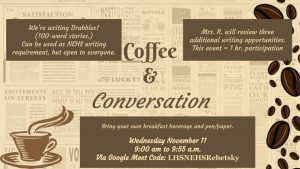
These new activities have helped prevent second-year members from repeating activities, keeping participants on their toes during interesting and new events.
“I really enjoyed Pi Week! We had such fun events, such as baking a pie and making bracelets. It was a week filled with so many engaging activities,” said Mu Alpha Theta member Elizabeth Rajnik.
Tutoring
Even though classes are virtual, the need for tutors hasn’t diminished. If anything, students have struggled even more to understand their classwork.
“Even though we are in Google Meet classes, this is not the same as being in class. Sometimes you will get to talk to other students in the class, but most of the time you have in classes is spent cramming in as much of the curriculum as possible,” said Jennifer Weiss, Mu Alpha Theta advisor.
Despite clubs being unable to meet with each other in person, honor societies have preserved their goals of supporting other students and helping in the community. Mu Alpha Theta was the first honor society to work out the logistics of their tutoring program for the 2020-2021 school year.
“Proud advisor moment here! Our officers paved the way for the other honor societies this year. We were navigating waters to help support LHS students prior to any other group. Our three officers brainstormed, worked hard in collaboration with Mrs. Hanlon and the rest of the administration to make tutoring happen,” said Weiss.
The other honor societies quickly followed suit, developing their own new tutoring requirements for their members to meet in order to maintain good standing. Societies for each subject have created and implemented their own Schoology groups, texting chains, social media announcements, Google forms and Google meets- all to connect students in need with available tutors. Scheduling tutoring became an important task for many officers.
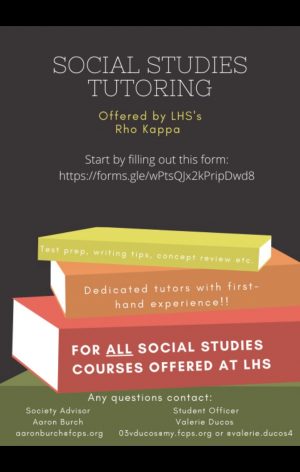
Ducos said, “The virtual tutoring system was a big new responsibility I had to figure out and manage. The in-person system had consistently stayed the same, it was easier to get it started every year and have each of the officers manage an aspect of it. Since everything is done online it is more difficult to operate the system and to set up, confirm, and log hours.”
However, these innovative strategies do not guarantee smooth sailing, as tutoring can still be difficult to set up and advertise when it cannot be completed in person. Students in need of assistance rarely sign up for tutoring opportunities on their own time, and many tutoring slots go unfilled.
Burch said, “The requirements of hours have been cut by 25% because there just are not the same kind of extracurriculars and outside-of-school activities available. Also, any tutoring, meetings and other functions must be done with google meet which does compromise all involved, from myself to the students themselves, as far as time and commitments.”
On the other hand, the members who have been able to provide their services to others have greatly enjoyed being able to tutor students, despite the obstacle of not sitting right next to them.
Rajnik said, “Math can be a super challenging and intimidating subject. Students are always in need of tutoring and help, and as an upperclassman, I think it’s a great way to be a part of the Linganore community and to be a helping hand for underclassmen. It’s a super rewarding experience! I was glad we were able to continue tutoring this year!”
Because all tutoring is done online, it has been easier for members to tutor students remotely. This has allowed even more students than usual to experience the numerous, significant benefits of honor society tutoring.
Rajnik has tutored senior Carolina Heister throughout the year. Heister learned about tutoring through her own honor societies and wanted some help with her math courses.
“I reached out for tutoring because I knew that I needed help and I wanted a student perspective, rather than just my teachers perspective. I really like virtual tutoring due to the ease of it. I am very busy and always on the go, so online tutoring fit in my schedule really well,” said Heister.
Closing
Between the current prevalence of virtual-only group meetings, alterations to school-sponsored activities, and general diminished connection between people, offering co-curricular activities and systems of support such as honors societies is more important now than ever before.
Farrell said, “Having clubs and honor societies during this time is crucial for student’s mental health… You do not realize how important the social aspect of school is until it is gone. Being able to have these clubs and honor societies have filled the gap for some students and keep them going in the online environment.”
The extreme lengths that advisors, officers, and members alike have gone to in order to continue operating only serves to prove the importance of offering clubs and honor societies in our school.
“Continuing to offer honor societies and extracurriculars is so important to the school experience, as it allows students to have fun and work with peers in subjects they are passionate about, which helps increase passion for learning,” said Toby Morseman, Rho Kappa president.
The importance of honor societies is especially apparent to the advisers who dedicate their time and energy to their success.
Rebetsky said, “I chose to be an advisor because I am passionate about the transformative nature of language arts: listening, speaking, and writing. I know there are so many opportunities for students to see how the power of words changes the world for the better.”
All in all, honors societies far exceed the reputation of just an extracurricular that helps on college applications- they exemplify the Linganore spirit of unity and perseverance through adversity in their ongoing dedication to promoting academic excellence, supporting their peers, and serving the community.
Your donation will support the student journalists of Linganore High School. Your contribution will allow us to purchase camera/recording equipment and software. We hope to raise enough money to re-start a monthly printed issue of our paper.


